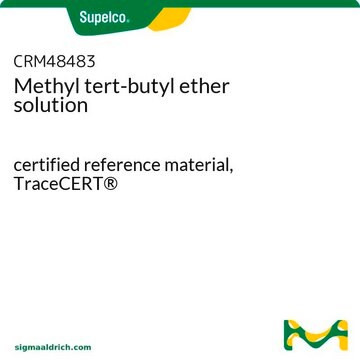1.01845
tert-Butyl methyl ether
for liquid chromatography LiChrosolv®
Synonym(s):
tert-Butyl methyl ether, MTBE, MTB, 2-Methoxy-2-methylpropane, Methyl tert-butyl ether, TBME
About This Item
Recommended Products
vapor pressure
268 hPa ( 20 °C)
Quality Level
product line
LiChrosolv®
grade
isocratic
Assay
≥99.8% (GC)
form
liquid
autoignition temp.
460 °C
potency
>2000 mg/kg LD50, oral (Rat)
>2000 mg/kg LD50, skin (Rabbit)
expl. lim.
1.5-8.5 % (v/v)
technique(s)
HPLC: suitable
impurities
≤0.0002 meq/g Acidity
≤0.0002 meq/g Alkalinity
≤0.02% Water
evapn. residue
≤2.0 mg/L
transmittance
240 nm, ≥60%
255 nm, ≥85%
280 nm, ≥98%
kinematic viscosity
0.409 cSt(40 °C)
bp
55.3 °C/1013 hPa
mp
-108.6 °C
transition temp
flash point -28 °C
solubility
42 g/L
density
0.74 g/cm3 at 20 °C
storage temp.
2-30°C
SMILES string
O(C(C)(C)C)C
InChI
1S/C5H12O/c1-5(2,3)6-4/h1-4H3
InChI key
BZLVMXJERCGZMT-UHFFFAOYSA-N
General description
Application
Used as an extraction solvent to analyze nucleotides of Drosophila gut microbiome in flies prior to LC-MS analysis.
Features and Benefits
- suitability tested and specified for UHPLC-MS and UHPLC-UV: for analytical flexibility
- specified quality in positive and negative in positive and negative electrospray ionization (ESI) and atmospheric-pressure chemical ionization-mass spectrometry (APCI-MS) for lowest detection limits and confidence in analyses for all important MS modes (test 1)
—ESI/APCI (-) < 10 ppb
- lowest impurity profile: for interference-free baselines (test 2)
- Microfiltered through 0.2 μm filter (test 3) to provide
—reduced risk of column clogging
- packed in borosilicate glass bottles for minimized metal ion contaminations
- lowest levels of trace metal impurities for a minimum metal ion adduct formation
- lowest level of polyethylene glycol (PEG) impurities in UHPLC-MS solvent lineup (PEG S/N signal-to-noise-ratio < 50)
Preparation Note
Analysis Note
Identity (IR): conforms
Evaporation residue: ≤ 2.0 mg/l
Water: ≤ 0.02 %
Acidity: ≤ 0.0002 meq/g
Alkalinity: ≤ 0.0002 meq/g
Transmission (at 240 nm): ≥ 60 %
Transmission (at 255 nm): ≥ 85 %
Transmission (from 280 nm): ≥ 98 %
Filtered by 0.2 µm filter
Other Notes
Legal Information
Not finding the right product?
Try our Product Selector Tool.
Signal Word
Danger
Hazard Statements
Precautionary Statements
Hazard Classifications
Flam. Liq. 2 - Skin Irrit. 2
Storage Class Code
3 - Flammable liquids
WGK
WGK 1
Flash Point(F)
-18.4 °F - closed cup
Flash Point(C)
-28 °C - closed cup
Certificates of Analysis (COA)
Search for Certificates of Analysis (COA) by entering the products Lot/Batch Number. Lot and Batch Numbers can be found on a product’s label following the words ‘Lot’ or ‘Batch’.
Already Own This Product?
Find documentation for the products that you have recently purchased in the Document Library.
Customers Also Viewed
Our team of scientists has experience in all areas of research including Life Science, Material Science, Chemical Synthesis, Chromatography, Analytical and many others.
Contact Technical Service








